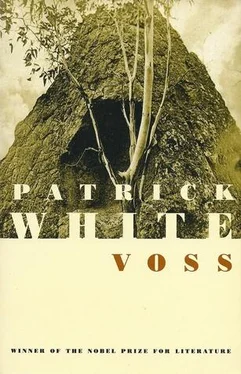‘And particularly for seeing fit to assume command.’
Judd stood there.
‘I did not take command, not intentional like.’
‘But it is for this that I commend you,’ answered Voss, looking ever deeper into Judd.
‘I did round up a few mules,’ the convict confessed. ‘And tell the men to see as the canvas was pegged down. And kill a beast. And send the blacks to look for water. Because I am a practical man.’
‘And mules must be rounded up. And men, men must be driven, although they blind themselves to the truth.’
Then the convict protested with great vehemence:
‘Not men. It is not so with men.’
This man was shaking, as if the wounds were opening in him.
‘Good, Judd,’ laughed Voss. ‘I will exonerate you from any such designs.’
But when the fellow had gone away, he continued to suspect him of exercising great power, though within human limits. For compassion, a feminine virtue, or even grace, of some sensual origin, was undoubtedly human, and did limit will.
So the German was despising what he most desired: to peel the whale-bone off the lily stem and bruise the mouth of flesh.
Ah, he cried, rubbing his face against the leather of the saddle-bag.
Then he lay more tranquilly upon the barren hillside. He thought about the woman whose consent was making her his wife. All twisted lusts had gone out of his body and the stunted trees. The sky was flowering at that hour, and the distant fields of vision. He lay breathing gently in this union of earth with light. He lay thinking of the wife from whose hands he would accept salvation, if he were intended to renounce the crown of fire for the ring of gentle gold. That was the perpetual question which grappled him as coldly as iron.
In a few days Voss was up. His will walked erect, if not yet his emaciated body. As the others were cured of their ills, Turner of all but the grumbles, and the offending mule of its lameness, the German called Judd and Palfreyman and informed them of his decision to make a start on the following morning.
It was a relief to put an end to inactivity on that scrubby slope. Life starts afresh with each fresh journey, even into the dust. So the forenoon and evening were filled with lively preparation.
Only Dugald was squatting inactive on the ashy fringe of a small fire. The old native was more than ever a man of ash and charred wood; his brittle hams might have crumbled at a touch.
‘What is it, Dugald?’ asked the German. ‘Are you not pleased?’
‘Blackfeller old,’ said the old man, in a voice that was his oldest. ‘This feller too old.’
How the notes of lamentation twangled on his bone harp.
‘This feller sick. Sick old. Wanta go back Jildra. This no place old feller die.’
‘I will not let you die, Dugald,’ Voss consoled lightly.
‘You let Mr Voss die. You no stop Dugald,’ answered the old black, looking gravely at the white man.
‘How let myself die ?’
‘Not now. No ready. You no stop when ready.’
This melancholy conversation that was taking place at the fire’s edge had its gaiety for Voss.
‘You old devil,’ he laughed, ‘you will see us all put in the ground.’
Then the old man himself began to laugh.
‘No here,’ he laughed ashily. ‘Jildra. Jildra good place. Please,’ he said, quickly, quietly. ‘I go away Jildra.’
But the German dismissed that possibility with his hand, and walked on.
The old man continued to nurse what was, indeed, a sickness of foreboding and fear. He was holding his old ashen head as he squatted by the fire. The hostile spirits of unfamiliar places were tormenting him.
Later, in the camp which had begun already to dissolve in anticipation of the morning’s move, Voss caught something of the old native’s melancholy, and began to look about at their blackened pots, at the leather tackle which sweat had hardened, and those presumptuous notebooks in which he was scribbling the factual details of their journey. Then the palms of his hands knew a great helplessness. The white sky, for it was again evening, was filled with empty cocoons of cloud, fragile and ephemeral to all appearance, but into which he would have climbed, if he had been able. As he could not, he continued to walk about the camp, and his men looked up from whatever work they were engaged upon, searching his face with the eyes of children who have not yet learnt to reject appearances.
So Voss, who was exhausted, besides, by the illness from which he had not fully recovered, went and sat by his own fire.
‘Dugald!’ he called, when he had decided, and taken paper.
The breeze was lifting the stiff paper, and rattling it slightly against his knee, as if it had been bark or twig, but, without his protection, would have scrabbled and tormented it, for such white constancy is anathema to the mouths of dust.
The old native came.
‘Dugald,’ said Voss, who was by this time somewhat feverish, or irritated, ‘ hör’ wohl zu . Tomorrow morning you will leave for Jildra. Verstanden? You will take the horse from Mr Turner. He old, poor horse, better to stay Jildra.’
‘Yes,’ laughed Dugald. ‘Old man same belong Jildra.’
‘That is exact,’ the German said. ‘ Warte nur . Give Dugald’s horse to Mr Turner.’
‘Yes,’ murmured the old black, who was now preparing to suffer all else with patience.
‘I write paper, give Dugald letter,’ Voss explained.
How the unborn letter rattled against his knees.
‘Dugald take same letter Mr Boyle.’
His words were lead bullets.
‘Now do you understand?’
‘Yes,’ said the old man.
Darkness sighed.
When he was alone again, the German spread the sheet of paper, on which the whole darkness converged, spread it on the boards of a notebook, and was prepared to write. His knees were trembling, but, of course, he had been ill. And firelight flickers. Dugald had been gone a long time, but Voss still hovered over the heading of his letter. Had he been in fullest possession of himself, he would have consulted his neat journal and copied down their latest estimated position. He was not, however, at that moment, self-possessed. He was sitting in the middle of nowhere. Which, naturally, was of too fantastical a nature, too expressive of his nothingness. Yet, out of nothing, he did finally begin, smiling painfully at the prospect of certain words, of which the sentiments remained unfamiliar.
Voss wrote:
My dear Laura,…
Addressing her thus intimately, as if he knew her, again the man hesitated. He knew that part of himself, the weakest, of which was born the necessity for this woman. With the latter he was acquainted from several cold conversations and one heated argument. They had met, besides, by flashes of intuition and in dreams. Whether or not such knowledge, haunting and personal though it was from some aspects, sufficiently justified his attitude, he touched the L gently with his pen, and so continued:
… Your letter has brought me great happiness. I will not say my only happiness, since I am underway to accomplish my also great, and long-conceived ambition. All these prizes falling to me at last make me at times confused, so that you will see you have inspired some degree of that humility which you so admire and in me have wished for! If I cannot admire this quality in other men, or consider it except as weakness in myself, I am yet accepting it for your sake.
There are many points of criticism in your letter that I could answer, but do not here in the circumstances in which I am placed, for those arguments appear to me rather as subjects for the tea-table, and here I have no such furniture from behind which I might make a stand. Indeed, we are reduced almost to infinity. In consequence, I will pass instead to those of your sentiments which, you profess, underlie your arguments, and which have been the cause of so much cordial happiness, while accompanying me these many weeks. That we should love each other, LAURA, does at last appear inevitable and fitting, as I sit here alone in this immense country. No ordinary House could have contained my feelings, but this great one in which greater longings are ever free to grow.
Читать дальше












